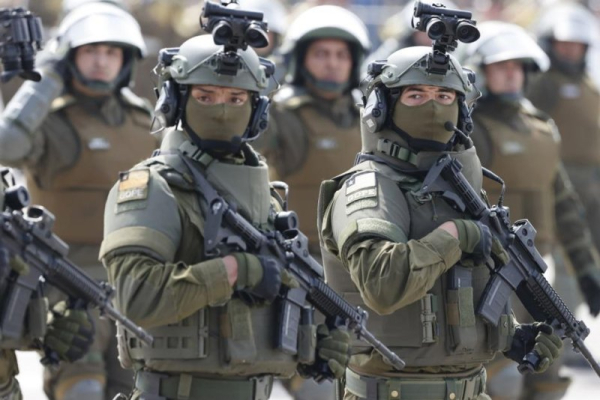

The discovery of drugs on Chilean military bases and vehicles in early July has raised alarms about possible infiltration of drug trafficking networks into the country’s armed forces. File Photo by Elvis Gonzalez/EPA
The discovery of drugs on Chilean military bases and vehicles in early July has raised alarms about possible infiltration of drug trafficking networks into the country’s armed forces.
Authorities found a shipment of narcotics hidden at a military base in Colchane, near the Bolivian border, followed days later by a suitcase containing ketamine aboard an Air Force plane. The incidents have prompted closed-door Senate sessions and demands for answers from military leaders.
The discoveries followed the June 29 arrest of seven people — six Army noncommissioned officers and one civilian — who were charged and placed in pretrial detention. Prosecutors accuse the group of trafficking at least 423 pounds of cocaine and cocaine paste.
Security Minister Luis Cordero said there are “serious cases” showing organized crime has infiltrated the armed forces and could threaten public security, though he denied it is a structural or widespread issue.
“This wasn’t an issue a few years ago, so legislation and measures need to be updated. Organized crime must be confronted early,” Defense Minister Adriana Delpiano said.
Both ministers participated in a special session of the Senate Constitution Committee to examine ties between organized crime and the armed forces, and to discuss legislative and administrative steps to prevent future infiltration.
Lawmakers addressed jurisdictional disputes between military and civilian courts, proposed reforms to the Code of Military Justice and efforts to bolster institutional intelligence and counterintelligence.
Counterintelligence is a key tool in the fight against organized crime, as it helps identify security gaps in the country, security expert Pilar Lizana told Chilean broadcaster Radio Bio Bio.
Since 2023, Chilean armed forces personnel have been authorized to assist with border control and monitor illegal crossings in the country’s north.
“The porous borders, the ease of drug transit and the search for alternative routes have made the country a key link in trafficking networks, exposing its institutions to corruption,” said Humberto García, president of the Chilean Institute of Public Policy.
The incidents have also reignited debate over lifting bank secrecy protections for public officials and military personnel — a proposal backed by pro-government sectors as a tool against corruption.
However, opposition leaders have raised concerns, arguing the change could infringe on individual rights.
Authorities and analysts agree that drug cartels and transnational criminal groups, such as Tren de Aragua, pose a growing threat to national security.
“The current situation demands a coordinated and forceful response from all branches of government. The credibility of the armed forces — vital to national security and public trust — is at stake,” Garcia said.
“Transparency in investigations, tough sanctions and strong oversight mechanisms will be essential to confronting this growing threat.”